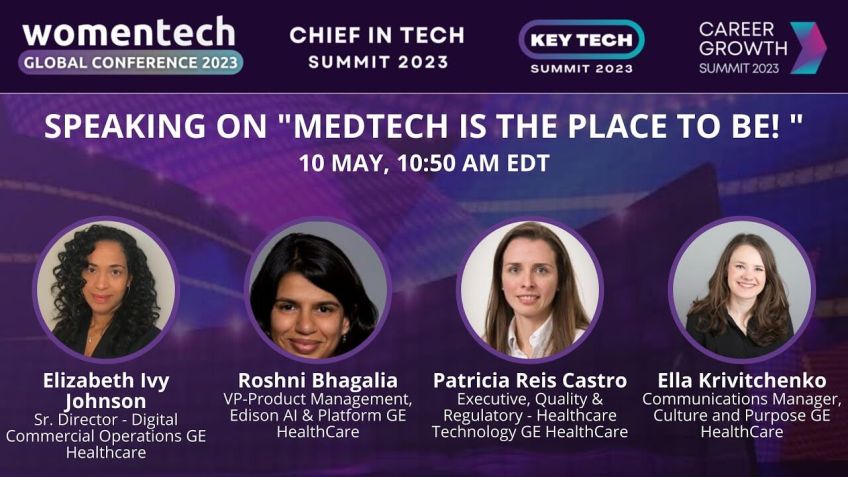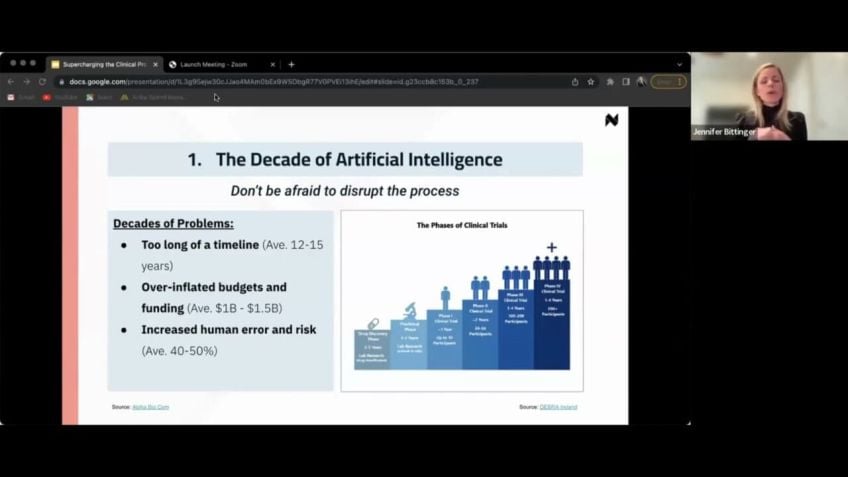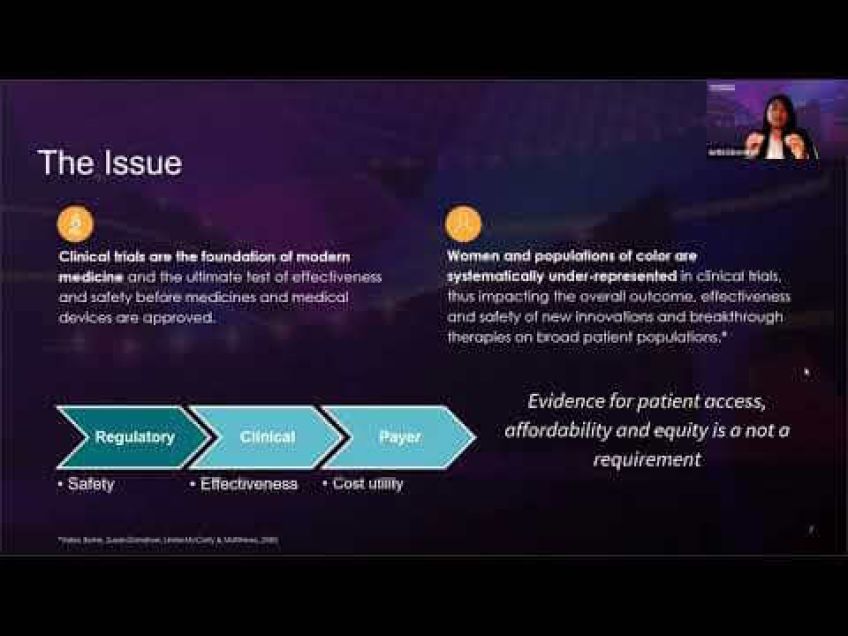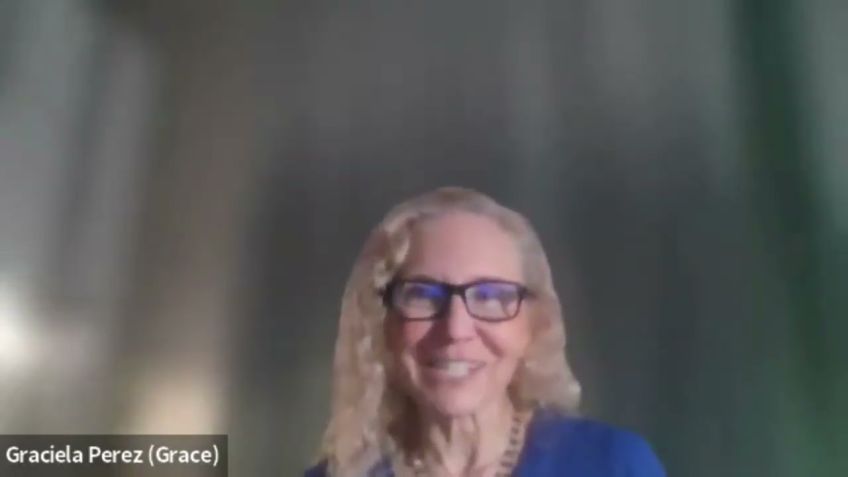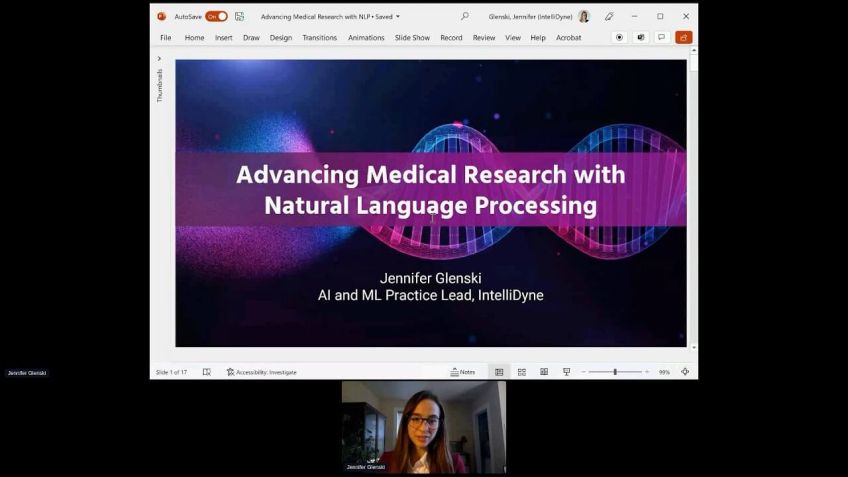Edison Accelerator: working with founders and start-ups to be stronger together
Unlocking Breakthrough Innovations with Collaboration
In today's rapidly evolving digital landscape, collaboration is key to driving innovation. As more industries realise the importance of working together rather than in silos, a prominent example is the healthcare industry. It has become increasingly apparent that adopting a collaborative approach, particularly in innovation, leads not only to remarkable technological leaps but also fosters customer satisfaction. G Healthcare's exclusive event in Bangalore highlighted this sentiment and introduced their flagship innovation - The Edison Accelerator.
The Power of Collaboration
Emphasising on the power of collaboration, NIA, the Director of Edison Accelerators G Healthcare, shared how G Healthcare has deconstructed traditional working paradigms to facilitate internal and external collaboration. The collective effort to innovate and evolve has proven to be a key driver for success, delivering outcomes that often seem like magic.
(Please note that NIA = Anita Ganesh, to give her her full name)
Learning from Failure
The value of collaboration is a lesson often learnt the hard way. Several corporate giants have lost ground due to failing to act quickly on the right collaboration model. Sub-optimal results are often trailed by innovations that have failed to collaborate within the innovation space, failing to think at the next level of innovation and how to work together to complement each other's strengths.
The Necessity for Seamless Integration
As the digital health era continues to evolve, seamless integration is essential for a medical device to deliver value. A device powered by state-of-the-art technology delivering precise readings must also be seamlessly integrated into the patient's electronic health record for easy and instant access. Acknowledging this, G Healthcare has pioneered breakthrough collaborations with innovative start-ups, external partners, academia, and research institutes to foster lateral thinking, empower employees, digitize processes, and encourage data-driven decision making.
The Edison Accelerator: Cultivating Innovation
As part of this collaborative journey, G Healthcare launched the Edison Accelerator. This unique programme engages with external partners to bring together the best of cutting-edge technology, industry expertise, and innovative thought processes.
A Step-by-Step Approach
The Edison Accelerator uses a stage-gate approach to ensure the selection of the right start-ups for the programme. Once on-boarded, these start-ups match the established use cases and problem statements. They then spend six months in a test environment, working closely with business, clinical, and technical mentors from the G healthcare team.
This collaboration not only facilitates better product development but also fosters a spirit of shared learning and growth. The experience and expertise start-ups bring to the table are complemented by seasoned engineers and leaders within the G Healthcare team, giving both entities a chance to learn, innovate, and grow together.
The Impact so Far
G Healthcare’s collaborative approach via the Edison Accelerator programme has undoubtedly made a mark. Over 900 screened applications and collaborations with over 20 start-ups have led to clinical pilots, market rollouts, and meaningful conversations.
In Summary
In a rapidly globalising and digitalising world, the mantra to success lies in strong collaboration. By respecting diverse perspectives, we can foster a culture of shared knowledge and growth, ultimately leading to more robust innovation. As G Healthcare’s Edison Accelerator programme demonstrates, the way forward is to collaborate, not compete.
Video Transcription
Um Yeah, I think I see more and more people joining here. So, hello everyone. Thank you for joining today for G healthcare uh exclusive event for Bangalore. We're super excited to see you here.And uh yeah, we're looking forward to hearing more from the team of G healthcare in Bangalore. So today we're going to start with uh Anita Ganesh who's already uh on stage, she will share more about the Edison Accelerator. And after that, we're going to have uh Rajna Mishra sharing more about her journey, the transition from architecture to project manager uh management. Um After that, we're going to have uh Sivani P Saati. She's the director of cybersecurity and G Healthcare and she's going to share more about that part of the company. And finally, we're going to have uh Ajay Ar Aruan Itan, who's going to be uh having a panel and all of these sessions are also going to have Q and A S. So feel free to use the chat for your questions. Uh Any comments, uh any thoughts. So yeah, feel free of course to share your comments. And uh yeah, Nn Miria, I'm really excited to hear your uh session. Uh uh NIA is the direction uh Director of uh Edison Accelerators G Health Care. So, yeah, the floor is all yours.
Thank you, Adriana. Am I audible? Yeah, absolutely. Thank you so much. Um Good afternoon, everyone. Happy Friday. Uh My name is NTA Ganesh and I lead the Edison Accelerator Program for G healthcare. So in today's session, um you will hear from me on how um and why we need to constantly innovate, right? Um Why do we need to up our game and uh one of the ways to do this and which is very, very key is to collaborate, right? And this is what G healthcare did with their flagship um you know, innovation Accelerator Program by working with not just the internal community but with external partners and start ups with an intent to becoming stronger together. So, um collaboration is the password for unlocking breakthrough innovations.
Collaboration is a key player in working towards customer satisfaction. And if I may collaboration according to me is the mantra, you know, for success, right? And um I'm stressing on this word collaboration because it's so powerful and can be underestimated at times, right?
And we all know that we sometimes learn the hard way and fail to understand that um it's a key driver to success, right? It helps bring some of the best minds together to create magical outcomes. And uh that's what my next 1520 minutes will focus on talking about the Edison Accelerator Program, how we at G health care and how my role needed to, you know, focus on collaborating internally and externally to achieve one of our program's objective, which is being stronger together through co innovation and collaboration.
Right? Um So this uh so, so let me, let me just kind of pause a bit, right? And let me look at what the health care industry today is showing us now looking at today's healthcare industry, for example, it's, you know, just taking that as an example, I'm sure it's there with all the other industries as well. But it's very clear that the way forward is collaborated rather than competitive, right? And I would also like to add that in order to innovate, collaboration is key and through collaboration, great innovation happens because somewhat might just have that secret ingredient to um you know, completing that um great recipe that you might have, right? And uh to me, collaboration has always been important and even to g health care um because in the era of digital, um you know, in the digital space in digital health, it's become even more important today, right? For example, just take the example of a medical device, it might be powered by state of the art technology and uh you know, deliver precise readings. But however, in the age of digital health, those readings must also be seamlessly integrated, you know, into the patient's electronic health record.
For example, otherwise it's meaningless, right? So that the patient can easily access and instantly access that. So in short, as the range of key competencies required for successful digital health innovation is ever growing. So too is the need for smart collaboration and all of us know this right, with technology changing faster than ever before, trust me. And I think um you know, all of you know it too, it's becoming very specialized, right, very very specialized, enabling it to bring in specialists with focus capabilities, for example, in niche areas. And uh we should encourage this, I think we should kind of pause and tell ourselves that this is something that we should um you know, embrace and encourage. And if I may um you know, see some food for thought here, right? We have seen that despite rapid growth, some of the large Corporates today continue to um you know, work with the prejudice that they have a strong word on the market, right? And they, they continued success is guaranteed, but that's not the case these days. Um And in the past, many corporate giants have failed to act right quickly on the right collaboration model, for example, and innovation plans which lead to sub optimal um you know, results because they failed to collaborate in the innovation space, right?
They have failed to think at the next level of innovation and how to, you know, kind of work together, how to trust each other. Um And complement each other's trends, for example, right? How to win, how to invent the next big products, not just for themselves but for the end customer, right? And um uh if I could take an example and I think a lot of us know this, right? Um you know, oh no offense to these great products that were there. But Kodak right dominated the photographic film uh market during the 20th century. The company blew its chance to lead a digital photography revolution as they were in denial for too long, you know, like their very own engineer, for example, actually invented the first digital camera back in um you know, the seventies, right? But it was a film photography.
They were like, it's cute, but you know, let's not tell the world about it, right? So the leaders of Kodak failed to see digital photography as a disruptive technology and maybe partnering with um you know, external partners or founders of start ups could have let led them into seeing um you know, a digital future for themselves, right? Blackberry smashing success in the nineties, right? They changed the game in, you know, mobile industry by offering an arched keyboard that encryption even, you know, as recent as the in, in the 2000 was second to none. But only if they had thought of user experience, right?
Only if they thought of the next level of innovation and in today's digital world, if I may say we cannot innovate alone, right? We need to reach out, we need to co create together, we need to create an environment where we can work towards being stronger together. And that's what I keep stressing because we've seen it, we've, you know, been there, seen it. Uh we are implementing that mantra today, right? And it's really working. Um many corporate giants are learning, um you know, actually leaning towards, um you know, co innovating with start ups today, right? Learning from them, looking at a faster paced outcome, um you know, for breakthrough technology to come together, right? For the founders of all of these start ups, I mean, the kind of rich knowledge and expertise they bring to the table is amazing, right? The best practices that sometimes we wish we could have been exposed to maybe earlier in the game and vice versa, right? There's a lot of this two way learning, there's a lot of exchange of, you know, best practices and ways to do it, ways to improve each other's solutions so on and so forth. The founders learn from the rich corporate experience that we bring to the table, right? Look at the seasoned engineers and leaders in the corporate world, everyone has these great ideas.
But when you get into a two way learning mode, you're you you're adapting to your inventing that, that next big great idea that maybe could not have been possible without, you know, that um the collaboration, if I could say, right? Um So just maturing the solutions, understanding uh you know each other's product better and giving suggestion is um is what this two way learning and when start up and Corporates comes together happens, right? And uh today we see that collaboration with external partners, be it academia, be it, you know, your start ups, your research institutes um really encouraging lateral thinking, right, empowerment of employees, digitization of processes, right? Data driven decision making. Are there major major factors for Corporates to consider to succeed? And um we have to do that if we want to stay ahead of the innovation curve and G healthcare is one of them, right? And we'll talk about it. Now, let's get into talking a little bit about, you know, the Edison about Edison and the A the program, right? So um G healthcare launched their new A I platform, Edison at the Radio uh Radiological Society of North America in 2019 with a very clear intent of being able to use, you know, tons of data that's coming in from the largest installed base of radiology equipment, right, globally.
Um to create algorithms to help clinicians, right? Um We wanted to provide our customers with a holistic integrated platform and a wide range of applications which is designed um you know, to help them use A I for faster and more accurate uh patient outcome and diagnosis for for that matter, right? And, and instead of clinicians working with several partners, right? And vendors who are available out there for different solutions, they can capitalize on an integrated platform which is offered to them as a one stop shop and they get to choose from all the applications that you know, could meet their clinical needs, right? And that's what the platform intends to do. But again, I want to stress and say we could not do all this alone. We have realized that this is something we need to reach our arms out to collaborate, to work with other masterminds out there, right? We knew that the way to accelerate at a much faster pace was through collaboration, right? We needed to tap into the ecosystem to not only enhance and build G applications but also third party apps and bring them together on the platform.
So we take it as one whole solution to the customer and instead of the customer looking at 34, you know, possibilities out there, you have G healthcare, taking this platform to them and saying, OK, you choose now and see what you want on your product for better uh and outcomes, right?
So opening up the platform to third party developers and um you know, creating an app stored out there for health care with the next logical step. And um with this vision, the uh Edison Accelerator was launched again in 2019. And um it was uh you know, uh the main reason why we launched it was to really harness the brain power and the energies of the start ups and allow them to use the building blocks of the Edison platform to deliver solutions um that address quality healthcare, right, for customers, not just locally but globally.
And um you know, in the last three years, we've launched programs not only in India but in Europe as well. And we're shortly launching programs in Canada and um Korea as well, right. We worked with about 20 plus start ups globally in various different domains from radiology, cardiology, oncology, genomics. What is it that our customers are asking? What is future technology for us? What is it that we need to step up and start catering to? Those are some of the areas that we started working towards with these um you know, um energetic start ups right now, if I, I'd like to take you through a very high level structure, right? There are several steps involved. But if I can cover very high level, um you know, to ensure that we put in all the efforts and mechanisms, right? To choose the right start up, it's very critical if you want to succeed. If you want to be stronger together, if you want, you know, desired outcomes out of any partnership, you should be able to create a win win situation. You're right. So um selecting the right start ups for the program and once they're selected, how do you ensure you commit to their success. That was very, very important, right? For us, it's a two way process as much as we want to see wins, collaborating with them.
How do they ensure that it's meaningful for them to partner with us? Right. It's a good 68 months, a lot of time and time is money today, right? For everyone and for the start ups, it's even more a premium for them. So how do we create that? Um you know, um healthy collaboration, how do we make it meaningful for them? So we uh so we designed um uh you know, a stage gate approach where we validated problem statements and use cases and aligned start up solution to those. And um what we did is once we on boarded start ups that aligned to the use cases and problem statements that we defined internally. We along with, you know, business mentorship, clinical mentorship and technical mentorship that you know, we brought together, we allow the start ups to build and demo their solution to show market readiness, right? So all of these start ups spent six months with G healthcare in a test environment in a sandbox environment to see how they could integrate the solutions on the platform through very, very um you know, focused feedback. And when I'm talking about collaboration, when I'm talking about we being stronger together today, you can clearly see clinical mentorship is all external business mentorship, not just internal but external perspective, right?
Technical mentorship, a lot of rich technical talent internally, everyone coming together to ensure that we are working towards the next phase which you know is piloting these applications after the test environment and then going into the markets together to build together, right to get into various different agreements together.
So this was a high level structure that you know, we had put in place. Now, excuse me now, talking about phases, I thought a bit of it. But you know, this slide will show you that every phase in the program requires us to join hands with key stakeholders, right? To take and make informed decisions, right? It's not a one man army, right? It's not one person drawing the um you know, um coins out there, it's not one person saying we need to do this. Yes, you might have an idea but you need several people coming together, right? Several stakeholders coming together and how do, how do we do? What is the, what, how do you carve out a process where various different deliverables and uh you know, opportunities get exchanged, right? Where, where you lead from one stage to the other successfully to ensure that you're actually um completing your six month collaboration effectively for meaningful outcomes, right?
So we get into the scouting and screening phase, we assess with the help of ge expertise, um you know, not just at A PM O level but at a business product level, evaluating start ups at, you know, 34 different um evaluation panel levels and then on board them, once we know that their use cases align that their solutions align with our use cases, and we can kind of work together to see how we can integrate solutions and take them to markets together.
So spending six months with them 6 to 8 months with them, um you know, gives us an opportunity to collaborate with a lot of internal expertise and external expertise. And again, there's so much of learning exchanged here, right? Um You know, we come up with an architecture diagram to see what exactly we need to solve for. And at that time, a lot of our internal expertise, learn new ways of putting things together, right? Um The start ups uh you know, might find um you know, inputs on how to mature the solution and do things differently and tweak it along the way. So these are the different phases of um you know, the accelerator program, right? And uh just moving on, if I could talk about any program that anyone launches has an evolution, right? Where you started? How did you even start, you know, with like, oh my God, this is a white uh plane slate that I have and how do I fill in the first milestone and travel the journey I want to travel. So um while I cover the program evolution, I also want to kind of touch upon my journey in this um you know, in, in in this evolution, right? So if you look back to 2019, there was a huge question mark, right?
There was, there was no process, there were no um you know, we didn't have an idea as to how we wanted to go about the whole evaluation, the scouting, um the integration phase, right? And then you kind of scratch your head and say hang on, I can't put all this together, right? You need, you need to really design a program to ensure that you have the right talent, the right internal resources to make this program successful, to even take it off ground. And I think that's what we focus on in your one, right? And like every program we define it with time, right? It was aimed to consolidating learnings and wins that we saw from the previous cohorts. And eventually it was all about deploying these uh processes and scaling up, right? Um from an operation standpoint. So in line with this philosophy, um we've worked with about 17 start ups so far in India and more than six start ups globally. And um you know, where we worked with the start ups initially, um we we we focused on, you know, every kind of start up right from early stage to growth stage to domains like radiology where we were very comfortable.
But as we leaped into 2020 right, with the launch of our future cohorts, our focus was on building differentiation versus, you know, competitive offerings, right? With many healthcare activated programs, what would be differentiating factor for our program? There are so many programs out there, how would you go and say, you know, if you had three to pick from your plate today, why would you do choose G healthcare program? So we put a lot of thought and process into that, right? How do we, how do we better the program after a cohort, right, hearing from the founders of the start ups to internal expertise, right? How do we become stronger together? How do we, how should the next program design look that we are catering to customers needs? So there was a strong link to company strategy leading to a clear focus on um you know, interest areas and use cases. And we built in strong clinical immersions with clinical mentors, right? And looked at uh triggering partnerships with clinical institutions because without that, we can't run, run our pilots, we can't, you know, test the use cases or the integration that's happened in the test environment in the collaboration phase. So there was a tighter integration with the business, there was a tighter integration focus uh collaboration with uh you know, hospitals and um you know, and uh there was greater focus on colo and bilateral capability building and also from, you know, a capability building standpoint uh for instance, learning from the cohorts, we also learned in new areas like digital pathology and, you know, genomics, for example, right, um which involve things like understanding what the data looks like, how is it stored?
What is the hospital's workflow for the speciality? So, like I, you know, said I go back to all of this time spent all of the, you know, how we really evolved, nothing could be done without staying together without trusting each other and without capitalizing on each other's strengths and learnings. And um at the end of, I, I wouldn't say at the end, but, you know, if I could pause and, you know, um at this moment, I would smile and say that we've come a long way, there've been a lot of ups and downs, we've come a long way. But, you know, we've been able to scale, we've been able to expand globally. We've been able to create a plug and play, um you know, situation with minimal hand holding from GL care for the start ups and we've been able to take integration to the next level, um which, you know, everyone would want to go to market together, right? So, um that's my little journey and that's how the program is awarded as well. Um Just trying to look at time.
Um So the impact so far we've had about, you know, between um India and um Europe, we have the Canada and Korea program work in progress launching very soon. But so far we've had over 900 applications screened and that's a lot of work. Right. And, um, you know, there are such promising applications which you pick, which you draw. Right. We work with over 20 plus start ups. Um, you know, we've signed up clinical pilots, we've um, you know, taken applications to market and we've had some really meaningful conversations.
So, yeah, it's a moment of um, you know, a moment to smile and say, yeah, you know, few things have gone, right? Internal wins, right? Um You know, um I think building Edison's capability in new areas such as genomics and pathology where technical requirements and um the hospital workflow was very different. Uh you know, because radiology is a traditional strength of GGE but playing in new areas was, was a big win for us, good learning for us and culturally, we've expanded globally, right? Um We've created a pool of uh rich mentors internally and externally who are always wanting to come forward and um you know, kind of um you know, help the start ups, help the program get to the next level, right? Um So that's from a cultural standpoint and from here, right? Make this entire, I think, where do we really go from here? What is our next thought process? I think it's, you know, make this entire process from integration, go to market, right? Plug and play, which makes it scalable, right? With minimal hand holding from g healthcare, um disruptive technology, create groundbreaking solutions for our customers and with our start ups and I would stress on that work together, right? Because I think we are strong together.
Each one has their own strengths. Um you know, brings in their own niche capabilities, but trust me, there is magic in coming together. Ok. In summary, um you know, uh I'd like to kind of close by saying that the recipe for baking a great dish is teamwork. You don't need too many cooks there, right? But you need the right ones, um truly passionate about what you do believe in the outcome and respect diverse points of view, right? You will have a team who is backing you up, trust me. Um You know, um there are so many rich perspectives brought to the table. Every, every, every perspective has its own plus so kind of respect that and last, but not the least I would like to um you know, leave by uh leave you with one mantra. Um I strongly believe in, right? Which is we can innovate better together and um you know, we stand together, right? The way forward is to collaborate rather than compete. Thank you so much. Um You know, um I've enjoyed kind of putting this information together and um I enjoyed this afternoon presenting this. So, thank you so much.

